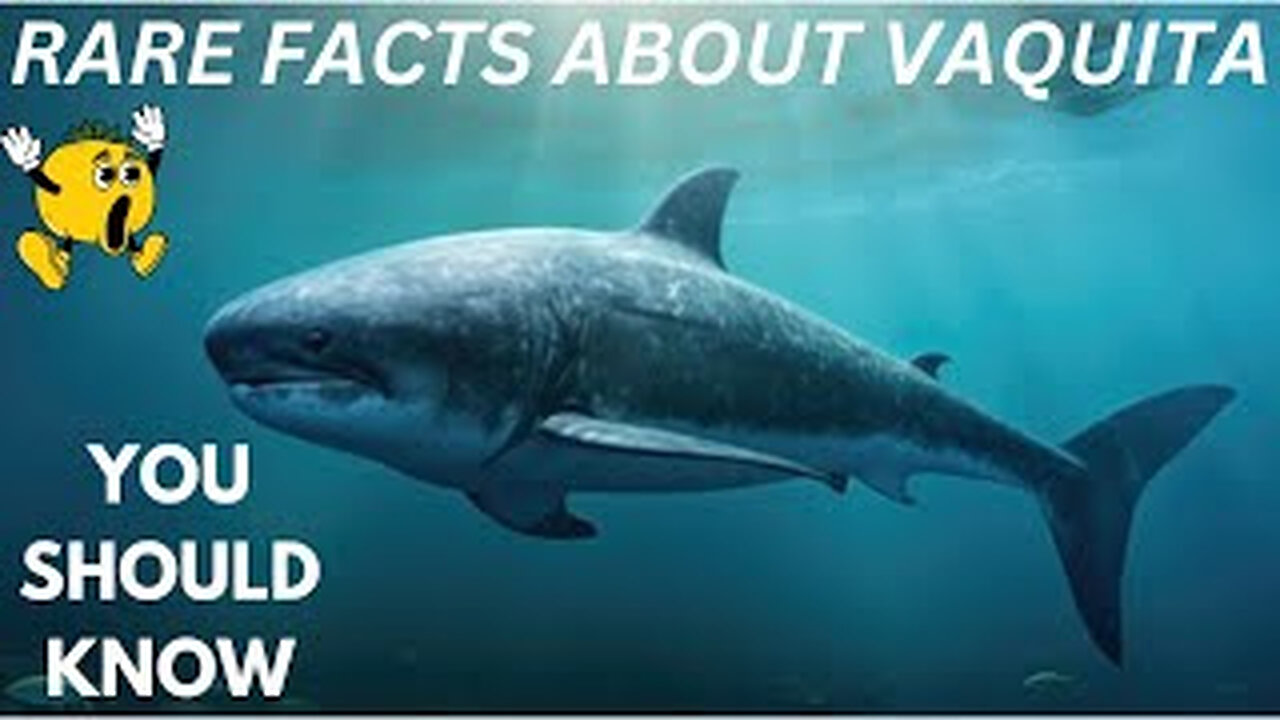Premium Only Content

Rare Facts About Vaquita | You Don't Know
The vaquita (Phocoena sinus) is the world's rarest marine mammal and critically endangered, with fewer than 10 individuals estimated to remain. Here are some rare and interesting facts about the vaquita and the reasons for its endangered status:
Rare Facts About Vaquita
1. Smallest Marine Mammal:
Vaquitas are the smallest cetaceans, growing up to 4-5 feet (1.2-1.5 meters) long and weighing around 95 pounds (43 kg).
2. Distinctive Appearance:
They have a unique appearance with dark rings around their eyes and lips, giving them a "smiling" look.
3. Shy and Elusive:
Vaquitas are very shy and rarely seen, making them difficult to study. They avoid boats and have a tendency to surface only briefly to breathe.
4. Limited Range:
They live exclusively in the northern part of the Gulf of California, Mexico, making their habitat highly restricted.
5. Solitary or Small Groups:
Vaquitas are usually seen alone or in small groups of 2-3, unlike many other cetaceans that travel in larger pods.
6. Long Breeding Cycle:
Female vaquitas give birth only every 2 years, with a gestation period of about 10-11 months, limiting population growth.
7. Critical Ecological Role:
They play a vital role in the marine ecosystem by maintaining the balance of species they prey on, including fish and squid.
---
Why Vaquitas Are Endangered
1. Bycatch in Illegal Fishing:
The primary cause of the vaquita’s decline is accidental entanglement in fishing nets, particularly gillnets used to catch totoaba fish. Totoaba swim bladders are highly valued in illegal trade, especially in China.
2. Habitat Loss:
Pollution, habitat degradation, and reduced water flow from the Colorado River have affected the vaquita's ecosystem.
3. Illegal Fishing Practices:
Despite fishing bans and conservation efforts, illegal fishing continues due to high financial incentives in the black market.
4. Slow Reproduction:
With a low reproductive rate, vaquitas cannot recover quickly from population losses.
5. Lack of Awareness and Enforcement:
Public awareness about the vaquita's plight is limited, and enforcement of fishing regulations has faced challenges.
---
Conservation Efforts
1. Fishing Bans and Protected Areas:
The Mexican government has banned gillnets in the vaquita’s habitat and established marine protected areas.
2. International Collaboration:
Conservation organizations like the World Wildlife Fund (WWF) and the International Committee for the Recovery of the Vaquita (CIRVA) are actively working to save the species.
3. Awareness Campaigns:
Efforts are underway to raise global awareness about the vaquita’s plight to reduce illegal fishing demand.
The survival of the vaquita depends on urgent action, stricter law enforcement, and increased international support.
Rare facts about Vaquita you don't know
-
 10:05
10:05
DIY Wife
3 years agoHow We Flip Old Furniture For Profit!
80K63 -
 2:14:54
2:14:54
TheSaltyCracker
13 hours agoTrump Goes Gangster ReeEEeE Stream 01-26-25
189K359 -
 4:42:13
4:42:13
Due Dissidence
22 hours agoTrump Calls To "CLEAN OUT" Gaza, Swiss ARREST Pro-Palestine Journalist, MAGA's Hollywood Makeover?
86.3K114 -
 2:02:20
2:02:20
Nerdrotic
14 hours ago $21.42 earnedDECLASSIFIED: JFK, MLK UFO Immaculate Constellation Doc | Forbidden Frontier #089
103K19 -
 3:00:14
3:00:14
vivafrei
22 hours agoEp. 248: "Bitcoin Jesus" Begs Trump! Rekieta Gets Plea Deal! Pardons, Deportations, Bird Flu & MORE!
223K259 -
 3:44:06
3:44:06
Rising Rhino
21 hours ago $15.16 earnedWashington Commanders Vs Philadelphia Eagles: NFL NFC Championship LIVE Watch Party
105K6 -
 13:00
13:00
Exploring With Nug
15 hours ago $7.64 earnedHe Went To Get A Haircut And Vanished WIthout a Trace!
85.5K9 -
 18:53
18:53
DeVory Darkins
2 days ago $34.75 earnedTrump JUST ENDED Mayor Karen Bass During HEATED Meeting
113K227 -
 21:06
21:06
Russell Brand
19 hours agoIT'S COMING
173K619 -
 21:26
21:26
Stephen Gardner
1 day ago🔥What JUST leaked out of Congress must be STOPPED NOW!
154K292